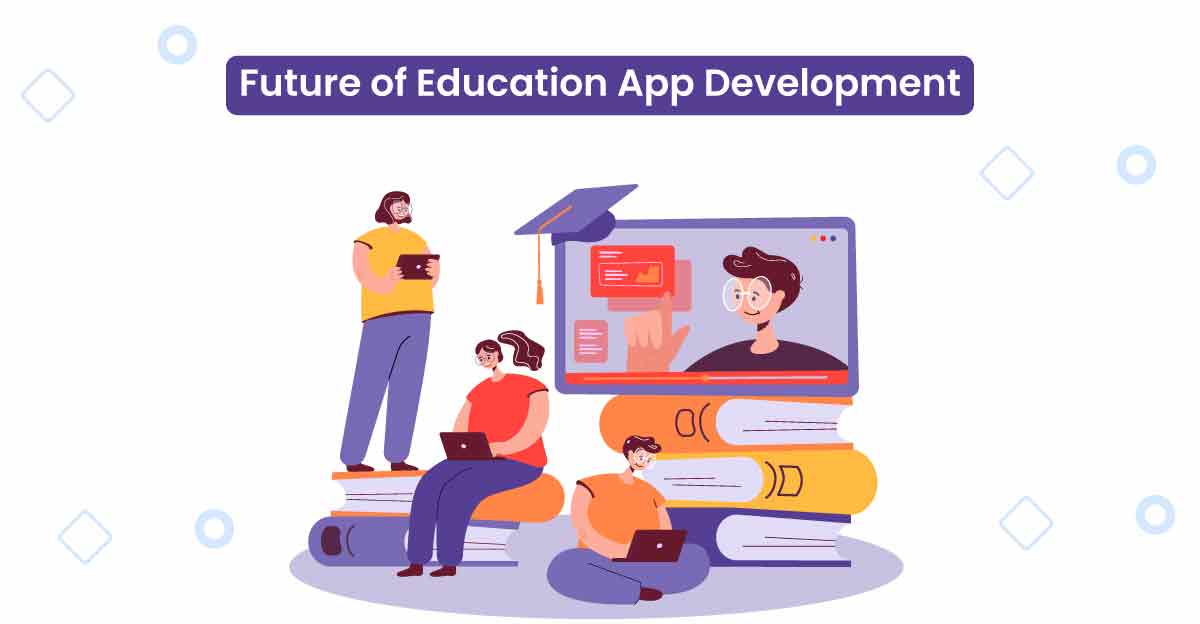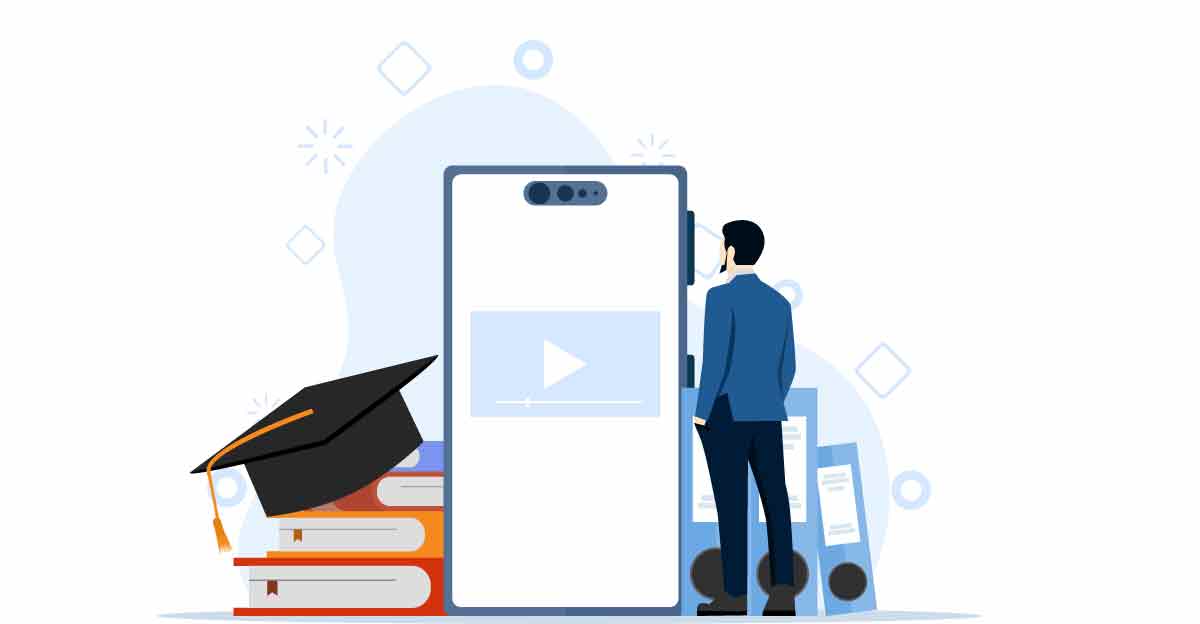Future of Education App Development
Education is one of the most important aspects of human life. It shapes our minds, our skills, our values, and our future. With the rapid advancement of technology, education is also transforming. More and more people are turning to online learning platforms, mobile apps, and digital tools to enhance their education experience.

But how can you create an education app that stands out from the crowd? How can you design an app that meets the needs and expectations of your target audience? How can you ensure that your app is engaging, effective, and user-friendly?
In this blog post, we will answer these questions and more. We will guide you through the process of education app development, from ideation to launch. We will also share some tips and best practices from our experience as a leading mobile app development company.
What is an Education App?
An education app is a software application that provides educational content or services to users. Education apps can be categorized into different types, such as:
Course-based apps:
These apps offer online courses or programs on various topics, such as languages, business, arts, etc. Users can enroll in these courses and access them anytime, anywhere. Examples of course-based apps are Coursera, Udemy, Khan Academy, etc.
Quiz-based apps:
These apps test the knowledge or skills of users through quizzes or games. Users can challenge themselves or compete with others on various subjects, such as trivia, math, geography, etc. Examples of quiz-based apps are Quizlet, Duolingo, Kahoot, etc.
Reference-based apps:
These apps provide information or resources to users on various topics, such as dictionaries, encyclopedias, calculators, etc. Users can use these apps to look up facts, definitions, formulas, etc. Examples of reference-based apps are Wikipedia, Google Translate, Wolfram Alpha, etc.
Skill-based apps:
These apps help users learn or improve a specific skill or hobby, such as music, photography, cooking, etc. Users can follow tutorials, watch videos, practice exercises, etc. Examples of skill-based apps are Yousician, Skillshare, MasterClass, etc.
Why Should You Build an Education App?
Building an education app can be a rewarding and profitable venture for several reasons:
You can reach a large and growing market:
According to Statista, the global e-learning market size was valued at $144 billion in 2019 and is expected to grow to $374 billion by 2026. Moreover, the number of mobile learners is projected to reach 2.7 billion by 2023.
You can make a positive impact on society:
By creating an education app, you can contribute to the advancement of education and knowledge in the world. You can help people learn new things, improve their skills, achieve their goals, and enrich their lives.
You can generate multiple revenue streams:
There are various ways to monetize an education app, such as subscriptions, in-app purchases, advertising, sponsorships, etc. You can choose the best model for your app based on your target audience and value proposition.
How to Build an Education App?
Building my app is not a simple task. It requires careful planning, research, systematic approach to ensure its success and effectiveness.
Define Your Objective and Target Audience:
Clearly define the purpose of your education app. Are you focusing on language learning, skill development, test preparation, or another niche?
Identify your target audience (students, professionals, hobbyists) and their specific needs.
Market Research:
Conduct thorough market research to understand the competitive landscape.
Identify successful apps in your niche and analyze their features, strengths, and weaknesses.
Identify trends and emerging technologies in the education app market.
Set Clear Goals and Features:
Outline the core features your app will offer, considering the needs of your target audience.
Prioritize features based on their importance and impact on user experience.
Define your app's unique selling points (USPs) that differentiate it from existing solutions.
Choose the Right Technology Stack:
Select the appropriate technology stack for your app based on its requirements (iOS, Android, or cross-platform development).
Choose a programming language, frameworks, and tools that align with your development goals.
Design an Intuitive User Interface (UI) and User Experience (UX):
Create wireframes and prototypes to visualize the app's layout and navigation.
Prioritize user-friendly design, ensuring easy navigation and a visually appealing interface.
Consider accessibility features to make your app inclusive for all users.
Development:
Choose a development methodology (Agile, Scrum) and set up a development environment.
Divide the development process into sprints and set milestones for each phase.
Regularly test and debug code to ensure a smooth development process.
Integrate Key Features:
Integrate the core features identified during the planning phase.
Implement interactive elements, gamification features, and any other functionalities that enhance user engagement.
Implement Backend Functionality:
Develop a secure and scalable backend to handle user data, content delivery, and other server-side operations.
Implement databases, APIs, and other backend components.
Testing:
Conduct thorough testing to identify and fix bugs, usability issues, and performance issues.
Test your app on different devices and operating systems to ensure cross-platform compatibility.
Security and Compliance:
Implement security measures to protect user data and ensure compliance with data protection regulations.
Secure communication channels and implement encryption where necessary.
Launch and Marketing:
Deploy your app to the App Store, Google Play, or other relevant platforms.
Develop a marketing strategy to promote your app, including social media, content marketing, and partnerships.
Gather User Feedback:
Encourage users to provide feedback and reviews.
Use feedback to identify areas for improvement and plan future updates.
Continuous Improvement:
Regularly update your app with new features, content, and improvements.
Stay informed about emerging technologies and trends in education application development.
Challenges in Education App Development
While the prospects of building an education app are promising, developers should be aware of the challenges they may face during the development process:

User Engagement and Retention:
It's crucial to keep users engaged and coming back for more. Creating interactive content, incorporating gamification elements, and providing regular updates can enhance user engagement.
Content Quality:
The success of an education app heavily relies on the quality of the content it offers. Ensure that your app provides accurate, up-to-date, and relevant information. Collaborating with subject matter experts or educators can contribute to content authenticity.
Personalization:
Users have diverse learning preferences and paces. Implementing personalized learning experiences, adaptive content, and progress-tracking features can cater to individual needs, making the app more effective.
Technological Integration:
As technology evolves, so should your app. Keep up with the latest advancements, such as augmented reality (AR), virtual reality (VR), and artificial intelligence (AI), to enhance the learning experience.
Security and Privacy:
Educational apps often deal with sensitive user data. Implement robust security measures to protect user information and maintain compliance with data protection regulations.
Cross-Platform Compatibility:
Users access educational content through various devices. Ensure that your app is compatible with different operating systems (iOS, Android) and devices (smartphones, tablets) to reach a broader audience.
Key Trends Shaping the Future of Education App Development
AI and Machine Learning:
Implementing AI and machine learning algorithms can enable adaptive learning experiences, personalized recommendations, and intelligent content delivery, enhancing the overall effectiveness of education apps.
Augmented and Virtual Reality:
AR and VR technologies can provide immersive learning experiences, particularly in subjects that benefit from visualization, such as science or history.
Blockchain for Credentials:
Utilizing blockchain can enhance the security and transparency of user credentials, certifications, and achievements, adding credibility to the education app.
Social Learning Features:
Integrating social elements like discussion forums, peer-to-peer collaboration, and live group sessions fosters a sense of community and enhances the social aspect of learning.
Microlearning Modules:
Short, focused learning modules are gaining popularity. Breaking down content into smaller, digestible units makes learning more accessible and fits into busy schedules.
Data Analytics for Performance Tracking:
Implementing robust analytics tools allows educators and learners to track progress, identify strengths and weaknesses, and tailor the learning experience accordingly.
Choosing a Mobile App Development Company for Your Education App
When selecting a mobile app development company for your education app, consider the following factors:
Experience and Expertise:
Look for a company with a proven track record in developing educational apps. Check their portfolio to ensure they have experience in building similar projects.
Technology Stack:
Ensure that the company is proficient in the latest technologies relevant to education app development, such as mobile app frameworks, databases, and security protocols.
Client Reviews and Testimonials:
Reading reviews from previous clients can provide insights into the company's reliability, communication, and project management skills.
Scalability:
Choose a company that can accommodate the future growth of your app. The development team should be capable of scaling the app as user numbers increase.
Collaboration and Communication:
Effective communication is crucial throughout the development process. Choose a company that values collaboration, provides regular updates, and involves you in decision-making.
Conclusion
The future of education app development is dynamic and filled with opportunities for innovation. By understanding the challenges, incorporating key trends, and choosing the right development partner, you can create an impactful and successful education app. Whether you're aiming to revolutionize traditional learning methods, offer specialized skills training, or facilitate collaborative learning experiences, the right education app has the potential to make a lasting difference in the lives of users.
